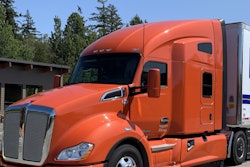 The state of California, joined by an aggressive Teamsters Union, appealed a preliminary injunction against A.B. 5’s enforcement on motor carriers to the 9th Circuit, where a panel of judges later this year will decide whether to keep it in place while the California Trucking Association’s lawsuit is fully tried.
The state of California, joined by an aggressive Teamsters Union, appealed a preliminary injunction against A.B. 5’s enforcement on motor carriers to the 9th Circuit, where a panel of judges later this year will decide whether to keep it in place while the California Trucking Association’s lawsuit is fully tried.California’s A.B. 5 law, which effectively prohibits fleets from contracting with owner-operator drivers, is still on a temporary court-ordered hold, and that short-term pause will remain in effect least through late 2020, if not longer.
Though no date is yet set, the federal Ninth Circuit Court of Appeals has indicated it will hear oral arguments sometime this fall, either virtual or in-person, as to whether trucking should remain exempt from A.B. 5 while a lawsuit brought by the California Trucking Associations (CTA) makes its way through court — a process that ultimately could take years.
“We’re confident that the preliminary injunction was rightly entered, because A.B. 5 is pre-empted” by federal law, said Bob Roginson, a partner at the firm Ogletree, Deakins, Nash, Smoak and Stuart, and the attorney representing CTA and two independent owner-operators in their case against the state. “If the Ninth Circuit comes down with what we believe to be a recognition of that fact, that would make it really clear,” he said, that their arguments to ultimately win the case are strong.
The court’s decision could boost CTA’s efforts to have motor carriers permanently excluded from the law. If the Ninth Circuit rules in CTA’s favor in the preliminary injunction, Roginson said the court effectively could “lay the pathwork” for the Southern California U.S. District Court’s decision in CTA’s case against A.B. 5. Whatever the court decides – to uphold the preliminary injunction or not – the case will go back to U.S. District Court in Southern California to be heard in full. After that, it’s likely to be appealed to the Ninth Circuit, then potentially on to the U.S. Supreme Court.
The U.S. District Court last January issued the preliminary injunction against A.B. 5’s enforcement on motor carriers. The judge in the case, U.S. District Judge Roger Benitez, agreed with Roginson’s and CTA’s assertions that California’s A.B. 5 conflicts with federal laws regulating transportation and motor carriers.
A 1994 statute set by the Federal Aviation Administration Authorization Act (F4A or FAAAA) says federal laws pre-empt any state-level laws that would “interfere with prices, routes and services” of motor carriers. That’s the statute Roginson and CTA are pressing the courts to uphold against A.B. 5 as it relates to trucking.
Benitez agreed with their arguments, writing in his January injunction order that California “runs off the road into the pre-emption ditch of the FAAAA.”
The state of California, joined by an aggressive Teamsters Union, appealed that injunction to the Ninth Circuit, where a panel of judges will decide whether to keep it in place while CTA’s lawsuit is fully tried. Roginson expects a decision this year from the Ninth Circuit as to whether A.B. 5 will apply while litigation against the law proceeds.
Greg Feary, a partner at the national transportation-focused firm Scopelitis, Garvin, Light, Hanson & Feary, also expects the Ninth Circuit to issue a decision this year, given the high-profile nature of the case and the weight it has for carriers operating in California.
For instance, motor carriers that operate in California, including major carriers such as Landstar, Prime and others, already had taken steps in recent years to either end relationships with independent contractors, such as leased owner-operators, or transition them to company/employee drivers. Some carriers have tried to establish brokerage operations and transition their leased owner-operators to true independents with their own DOT authority. Under that setup, carriers then would broker loads to those independent owner-operators.
However, all these work-arounds bring complications as compared to the preferred, traditional owner-operator lessee model in which a trucker who owns his own truck and business runs under a larger carrier’s operating authority.
For companies still working with independent contractors in California, Feary recommends closely examining contracts to ensure that they don’t run afoul of the long-standing Borello test, the previous standard test used to determine whether a worker could be classified as an independent contractor or a full-time employee before A.B. 5.
“Until and unless A.B. 5 is actually the law of the land” for carriers, said Feary, “the Borello test applies.”










